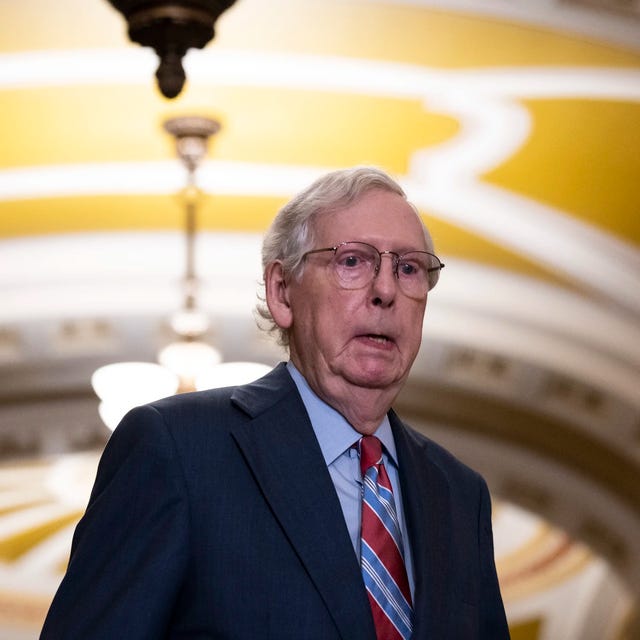This nightly newsletter is for paid subscribers only. Why subscribe? Read my mission statement! A subscription gives you access to not just this newsletter but ALL of my content. A subscription also comes with lots of other perks — including my weekly podcast with Chuck Todd! Subscribe by midnight tonight and get 20% of monthly and yearly subscriptions!
1. Mitch, Out
Mitch McConnell confirmed Thursday what every politico already knew: When his 7th(!) Senate term ends in 2026, he will retire.
McConnell, 83 years old today, has been in declining health for a while now; he fell twice in a single day earlier this month.
McConnell is, without question, a historic figure. He spent nearly two decades as the Republican Senate leader — a remarkable feat given the ambitious group he led. He fundamentally re-made the Republican party in Kentucky. He has long been one of the GOP’s best political strategists. His knowledge of Senate procedure and rules is unparalleled.
But, all of that is a precursor to, I think, the most critical question: How will McConnell be remembered in the long history of American politics? What, in short, did and does Mitch McConnell mean?
It’s a complicated question. And, after spending much of the day pondering it, I’ve come up with two answers to it.
The first is what McConnell meant BT — Before Trump. The second is what McConnell meant DT — During Trump.
Let’s start with BT McConnell.
Had Donald Trump never ridden down the golden escalator in 2015, I think McConnell would be — rightly — remembered — as one of the architects of the modern conservative movement and Republican party.
McConnell, more so than ANY GOP politician up to and including presidents, transformed the federal judiciary. Early on in his Senate career he set as a goal to put conservatives judges into these lifetime positions. And for decades, he systematically worked at it.
In February 2024, when McConnell announced he would step down as GOP leader, Brookings judicial nominations expert Russell Wheeler told Bloomberg: “Mitch McConnell saw the policy-making potential of the federal courts and worked hard – and succeeded – in getting as many vacancies filled, by and large, with young White conservative lawyers.”
The apogee of McConnell’s focus on remaking the federal judiciary came in 2016 when Supreme Court Justice Antonin Scalia, a conservative, passed away suddenly.
McConnell immediately refused to even meet with then President Barack Obama’s chosen nominee: Merrick Garland. McConnell insisted there was precedent that a Supreme Court pick should not be seated in a president’s final year in office.
Trump won the 2016 election. He appointed Neil Gorsuch to the Court. And the rest, as they say, is history.
McConnell’s other major BT legacy is campaign finance. For years, he and Arizona Sen. John McCain fought on the issue. McCain wanted money out of politics while McConnell insisted campaign donations amounted to speech and attempts to limit one necessarily meant limiting the other.
While McCain won a big battle — the Bipartisan Campaign Finance Reform Act passed in 2002 — McConnell won the war. Money keeps flowing into elections. More and more of it. And, candidly, McCain’s legislation simply made that money harder for reporters (and other observers) to track.
We can debate whether McConnell’s accomplishments on judges and money in politics are good or bad. But they were — and are — major tectonic plate-shifting changes in how our government and campaigns work.
And, had there never been a President Donald Trump, we would be left to that debate. But, well, there is a President Donald Trump. And I suspect McConnell’s actions vis a vis Trump may wind up being his lasting legacy.
Let me explain.
Keep reading with a 7-day free trial
Subscribe to So What to keep reading this post and get 7 days of free access to the full post archives.




